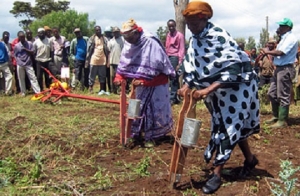One of the major constraints to the expansion and modernization of agriculture is the low level and limited use of mechanization especially by smallholder farmers. In southern Africa, agriculture has been characterized by the application of basic agricultural tools resulting in tedious and laborious practices, drudgery and low productivity. Smallholder farmers in the region can earn a decent living from agriculture only if they adopt mechanization.
The Food and Agriculture Organization of the United Nations (FAO), Southern Africa Development Community (SADC) and development partners have launched a Technical Cooperation Project titled “Developing a Roadmap to Leverage Sustainable Agricultural Mechanization for Climate Smart Agriculture (SAM4CSA) in Southern Africa”, which seeks to address challenges around sustainable agricultural mechanization in the region. The project was developed within the framework of the FAO Southern Africa flagship programme on SAM4CSA.
The launch brought together more than 50 experts, government representatives and other stakeholders to create awareness on project objectives and engage partners and stakeholders at the national and regional levels on the process of formulating a roadmap to leverage sustainable agricultural mechanization for climate smart agriculture (CSA) in the region.
“Effective and relatively smooth implementation of sustainable mechanization for climate-smart agriculture in Southern Africa requires the development of a roadmap for coordinated action at the subregional level that will guide countries to develop national sustainable agriculture mechanization roadmaps tailored to their local contexts,” remarked Patrice Talla, FAO Subregional Coordinator for southern Africa during the project launch.
In 2018, FAO and the Department of Rural Development and Blue Economy and Sustainable Environment (DARBE) of the African Union Commission (AUC), developed the Framework for Sustainable Agricultural Mechanization in Africa (F-SAMA). The framework provides the blueprint for sustainable agricultural mechanization (SAM) in Africa. Among other key elements of the framework, it focuses on making agricultural mechanization environmentally sustainable by highlighting the importance of transforming land preparation, cropping and husbandry practices.
“Mechanization falls under pillar one of the SADC Regional Indicative Strategic Development Plan for 2020 – 2030 and SADC’s objectives clearly speak to FAO’s strategic framework. The theme today is fully part of the implementation of SADC’s regional agriculture policy to increase production, productivity and competitiveness and address all the relevant aspects that are critical to transform agriculture,” said Domingos Gove, Director of Food and Natural Resources in the SADC Secretariat in his welcome remarks during the launch.
During the launch, FAO presented the methodology to develop the roadmap for sustainable agricultural mechanization for Climate Smart Agriculture in the region. An overview of some key principles to be considered in developing an agricultural mechanization roadmap was also presented. In early 2023, the project implementation team will organize a regional stakeholder consultative workshop that will involve the review of a draft regional roadmap developed with input from reports prepared by national consultants in each of the 16 SADC Member States.
By the end of the project, it is expected that a clear Southern Africa regional roadmap and action plan endorsed by the Member States, key stakeholders and development partners will be produced.
Article from: FAO

